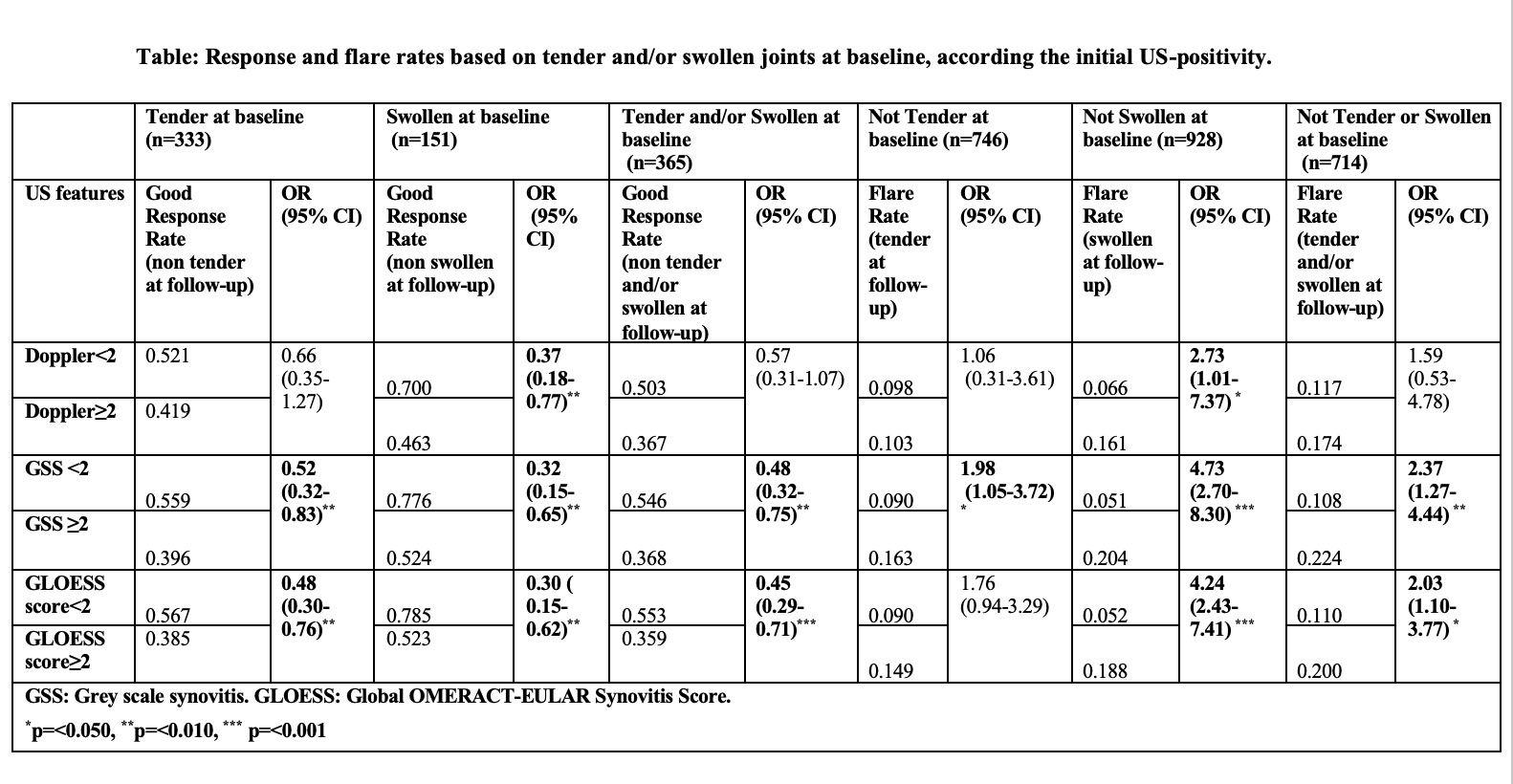Session Information
Date: Saturday, November 16, 2024
Title: Imaging of Rheumatic Diseases Poster I: Inflammatory Arthritis
Session Type: Poster Session A
Session Time: 10:30AM-12:30PM
Background/Purpose: It is not clear how to interpret when the ultrasound and physical examination do not agree on a joint level. In this study, we aimed to investigate, within PsA patients who are about to start an advanced therapy: a) the likelihood of achieving good response; b) the risk of experiencing a flare, on a joint level, 3 months post-therapy, based on the baseline ultrasound inflammation.
Methods: At the ORCHESTRA (Ottawa Rheumatology CompreHEnSive TReatment and Assessment) Clinic, PsA patients starting a new advanced therapy are assessed using a protocolized US scan. Patients are evaluated in the same clinic three months after therapy initiation. For this analysis, all MCP, PIP, DIP, and wrist joints were included; and analysis was performed on a joint level. US findings at baseline were scored for Grey-scale synovitis, Doppler signals and Global OMERACT-EULAR Synovitis Score (GLOESS) on scale of 0-3; grade ≥2 being considered positive. Physical exam was conducted at baseline and at 3-months, documenting the tenderness and/or swelling. For prediction of response, joints that were tender and/or swollen at baseline were included in the analysis. For prediction of flares, joints that were not tender and/or swollen at baseline were analyzed. Odds ratios were calculated to determine response and flare rates.
Results: The analysis included 36 PsA patients (61.1% female) with a mean(SD) age of 50 (12.7). At baseline, 17 patients (47.2%) were bionaïve, while 19 (52.8%) patients had failed one or more biologic therapies. A total of 1079 joints were analyzed, 333 (30%) being tender, 151 (14%) being swollen, and 365 (34%) being tender and/or swollen at baseline.
Symptomatic joints with high inflammation on US at baseline had a lower response rate (less likely to become asymptomatic) at follow-up) than those without (OR range 0.30-0.66) (Table). Asymptomatic joints at baseline were more likely to flare (become symptomatic at follow-up) if their baseline US inflammation was higher (OR range 1.06-4.73). For both outcomes, the swelling had higher associations that the tenderness of the joint (Table).
Conclusion: Our study shows two critical implications of positive baseline US findings on a joint level: a) Tender and/or swollen joints with positive US findings are more resistant to therapies compared to those without, and b) Non-tender and/or non-swollen joints with positive US findings have a higher risk of developing symptoms. Although the integration of US findings into treatment algorithms is uncertain, they indicate the presence of a distinct patient phenotype.
To cite this abstract in AMA style:
Gazel U, Acikgoz S, Sabido-Sauri R, Bayindir Tsechelidis O, Sangwa S, Hepworth E, Aydin S. Prediction of Response to Therapies and Flares Based on Ultrasound Findings at Baseline in Psoriatic Arthritis: An Analysis on a Joint Level [abstract]. Arthritis Rheumatol. 2024; 76 (suppl 9). https://acrabstracts.org/abstract/prediction-of-response-to-therapies-and-flares-based-on-ultrasound-findings-at-baseline-in-psoriatic-arthritis-an-analysis-on-a-joint-level/. Accessed .« Back to ACR Convergence 2024
ACR Meeting Abstracts - https://acrabstracts.org/abstract/prediction-of-response-to-therapies-and-flares-based-on-ultrasound-findings-at-baseline-in-psoriatic-arthritis-an-analysis-on-a-joint-level/

